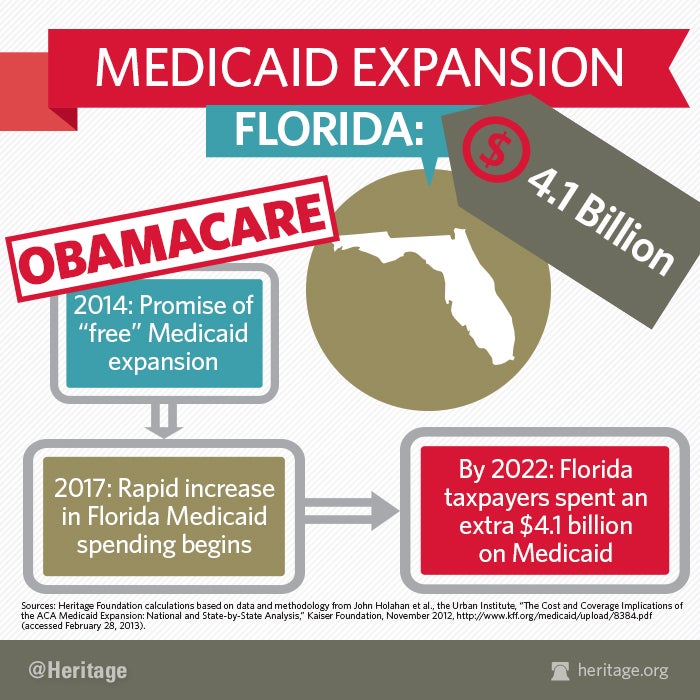Health Care Report from the States: Florida Medicaid Expansion
Tarren Bragdon /
As action to stop Obamacare languishes in Washington, the debate continues at the state level. Heritage is hosting a series of health care reports from our allies in the states to provide an up-close view of state-level action regarding Obamacare.
The states play an important role in protecting citizens against this flawed federal health care law–from challenging the health care law before the Supreme Court, to resisting efforts to establish Obamacare exchanges or expand a failing Medicaid program, to offering alternative proposals that will ensure citizens are not left abandoned when the federal law collapses.
Today, Tarren Bragdon—CEO at Florida Foundation for Government Accountability—updates Foundry readers on developments in Florida.
When Florida Governor Rick Scott (R) gave Medicaid expansion a metaphorical bear hug last February, he flip-flopped on a years-long record of opposition to the Affordable Care Act (Obamacare). Many argue that the grassroots army he built during his national anti-Obamacare tour in 2009 provided him the jolt of support he needed to win a close race for governor in 2010. But with his expansion flip-flop, it’s unlikely that army will fight passionately for him again.
The old Rick Scott knew why Medicaid expansion is a dangerous idea: an already bankrupt federal government couldn’t possibly keep its funding promise to cover states’ expansion costs, Medicaid is already failing patients and taxpayers and expanding it would stretch the safety net even more, and the states that previously expanded Medicaid are now facing nightmarish consequences.
Rick Scott’s reversal may have been a strategy of sacrificing policy principles to score political points as he prepares for a tough re-election campaign. If it is, he may soon suffer from buyer’s remorse. A poll commissioned by the Foundation for Government Accountability found that most Florida voters—especially Republican primary voters—are less likely to support pro-expansion politicians.
There wasn’t a big appetite among the Republican majorities in the Florida House and Senate to follow Rick Scott over the Medicaid expansion cliff. But there was even less willingness to do nothing to increase health coverage opportunities for low-income Floridians.
And so, Florida Health Choices Plus (FHCP) was born. House Speaker Will Weatherford (R–Wesley Chapel) and State Representative Richard Corcoran (R–New Port Richey) understood that expanding health coverage for low-income Floridians was a state priority. And because it was a priority, they reasoned any reform should be paid for with state dollars already in the bank, instead of relying on funding promises from a federal government that can’t even afford White House tours.
FHCP is a market-based alternative to Obamacare’s Medicaid expansion scheme. Instead of corralling all low-income patients into the government-designed and government-controlled Medicaid, FHCP was designed to fill the coverage gap for uninsured individuals who earn too much income to qualify for traditional Medicaid, but not enough income to qualify for coverage through the federal exchange. While the federally run exchange is expected to provide coverage options for 275,000 individuals between 100 and 138 percent of the federal poverty line, FHCP fills the gap for another 115,000 Floridians.
It does so by combining reasonable work requirements with a state-funded subsidy of $2,000 annually for most participants and an additional $25.00 in monthly contributions from those participants. These monies are deposited into a Contribution Account for Responsible Expenditures (CARE) Account. Participants would use their CARE Account funds to purchase private products that best meet their specific needs.
Ninety-one percent of Florida’s uninsured population report that they are in good health. This means participants would typically require catastrophic and maintenance/prevention coverage. The Weatherford–Corcoran plan creates a new health care marketplace for participants in FHCP. Along with traditional private plan opportunities, it gives the providers themselves the ability to develop their own plans targeted toward participants.
For example, a walk-in clinic could build a coverage package for an annual flu shot and wellness exam, while a dentist could develop a plan that includes just cleanings and X-rays. Imagine this approach as you would a drive-through restaurant. If all you were hungry for was two items off the dollar menu, you wouldn’t pay for a value meal when most of the extra food would go to waste.
This approach lets the health care marketplace be more responsive to individuals’ demands. A plan or provider might see an opportunity to attract more business from patients with a certain customized package that includes new or different services.
The combination of individual contributions, reasonable work requirements, choice counseling, and new transparency tools also promotes smarter management of health care and personal finances among participants.
Living in poverty should be and is typically a temporary circumstance. According to the Census Bureau, just 12 percent of individuals nationally live in poverty for more than two years. The financial skills FHCP participants retain from having greater management over their health care will help them as they transition off government assistance toward self-sufficiency and independence.
And while the Obamacare Medicaid expansion in Florida is projected to cost taxpayers anywhere from $3.7 billion to $19.5 billion annually, FHCP will cost Florida just $237 million a year to provide coverage for an estimated 115,000 uninsured Floridians.
And it doesn’t rely on any empty federal funding promises to do it.

